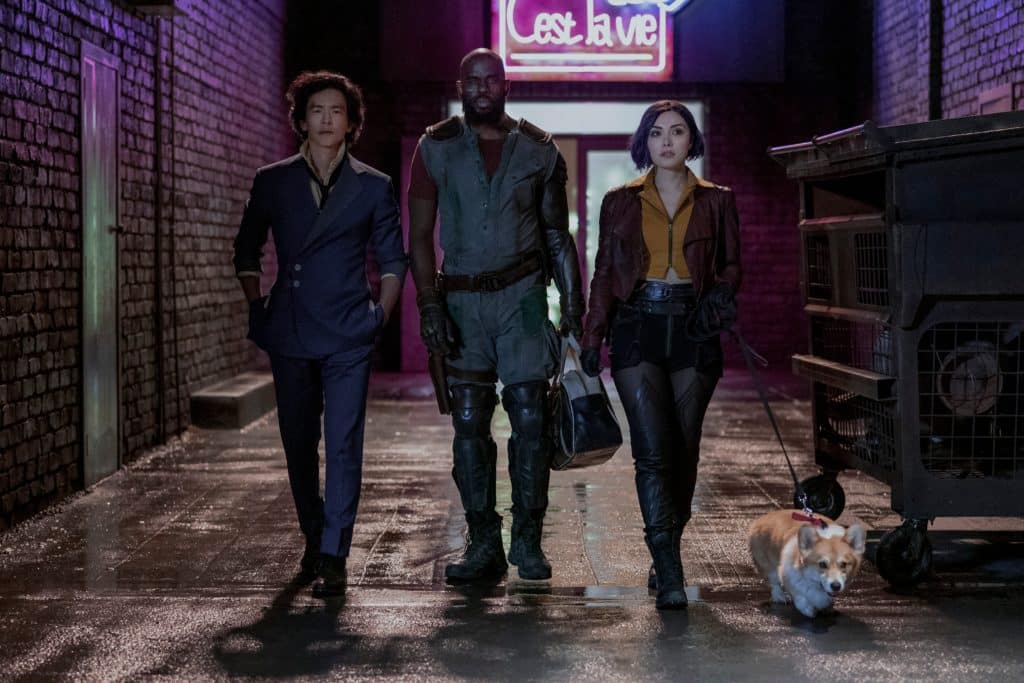Read also:
How to Watch FX Live Without CableHow To Watch AMC Without CableHow to Watch ABC Without CableHow to Watch Paramount Network Without CableNetflix’s new live-action interpretation feels sluggish and emotionally inert.
There’s a moment in the second episode of Cowboy Bebop that captures the experience of the entire series. Spike Spiegel (John Cho) fights a man in a bathroom while a wedding takes place in the same building mere yards away. As Jet Black (Mustafa Shakir) tries to figure out what’s happening over comms—despite it seeming fairly obvious—Spike gets the upper hand. He pauses, shifts slightly, pauses again, and then kicks the man through a bathroom stall door. The man helpfully stayed in place throughout.
There’s nothing, strictly speaking, bad about the scene when you take it in pieces. The fight is well choreographed and Cho (and his stunt double) proves to be good at physical acting. Shakir plays freaking out but quietly well. The use of color catches the eye.
And yet.
Everything feels like it’s moving through molasses. The fight is technically sound but so slow. It isn’t just that Spike gets an extra 3 seconds to line up his kick. That’s just the starkest moment of it. The skirmish feels like it is about two more rehearsals away from full speed. Jet Black’s reaction time feels similarly dulled. How could he not immediately grasp what was happening?

There’s a temptation to suggest that these scene aspects are purposeful to heighten both the cool and humor factors. If this is the case, however, then they’re still failures. The fight scene never reads as cool. The humor of Jet Black taking so long and then running to help Spike never lands. It still amounts to intention without execution.
That sense of so close but unshakingly far away permeates Cowboy Bebop. For everything it does right—Cho as Spike, for instance—it does two or three other things wrong. As a result, the show frequently seems to present situations it expects will elicit a particular emotional reaction without ever actually getting that reaction. It’s hardly the first live-action adaptation to make this error but that doesn’t make it any less disappointing.
Take, for instance, Spike’s tragic backstory. Presented in black and white flashback, it unfolds as a highly stylized mix of dream and trauma remembrance. It looks great. It also feels like nothing. The scene plays like several events in the series—shortcuts designed to remind fans of the source material without investing the effort to earn the same reactions.
It only compounds over time as well. When another character later reminds Spike of his trauma, the viewer doesn’t connect with the moment. Viewers didn’t feel anything the on first exposure; why would that change the second time?
[This adaptation’s] excessively reliant on viewers’ existing feelings about the source material to engender enthusiasm in this live-action interpretation.
The show fails to sell what about the character connects with Spike’s deceased lover. As a result, it ends up reading shallow, that our protagonist might react similarly to any attractive woman. There’s even further distance between the show’s intent and its execution. It can’t stop telling us without ever giving us even the briefest glimpse of showing.
Over and over again, this is the story of Bebop. It’s excessively reliant on viewers’ existing feelings about the source material to engender enthusiasm in this live-action interpretation.
Additionally, the times it does seek to differentiate itself, it almost always seems to make the wrong choices. For example, excising a storyline that conveys a sense of vulnerability on Faye Valentine (Daniella Pineda) doesn’t so much make her seem like a more assertive or robust character as make her a flatter, less dynamic one. Jet Black’s numerous mentions of being a single dad rapidly move from funny to eye-rolling.
All the style and cool promised by the “Lost Season” teaser is nowhere to be found in this final product. Instead, it feels like a hologram of a copy. Recognizable but devoid of both weight and depth.
Cowboy Bebop is getting noodles now on Netflix.